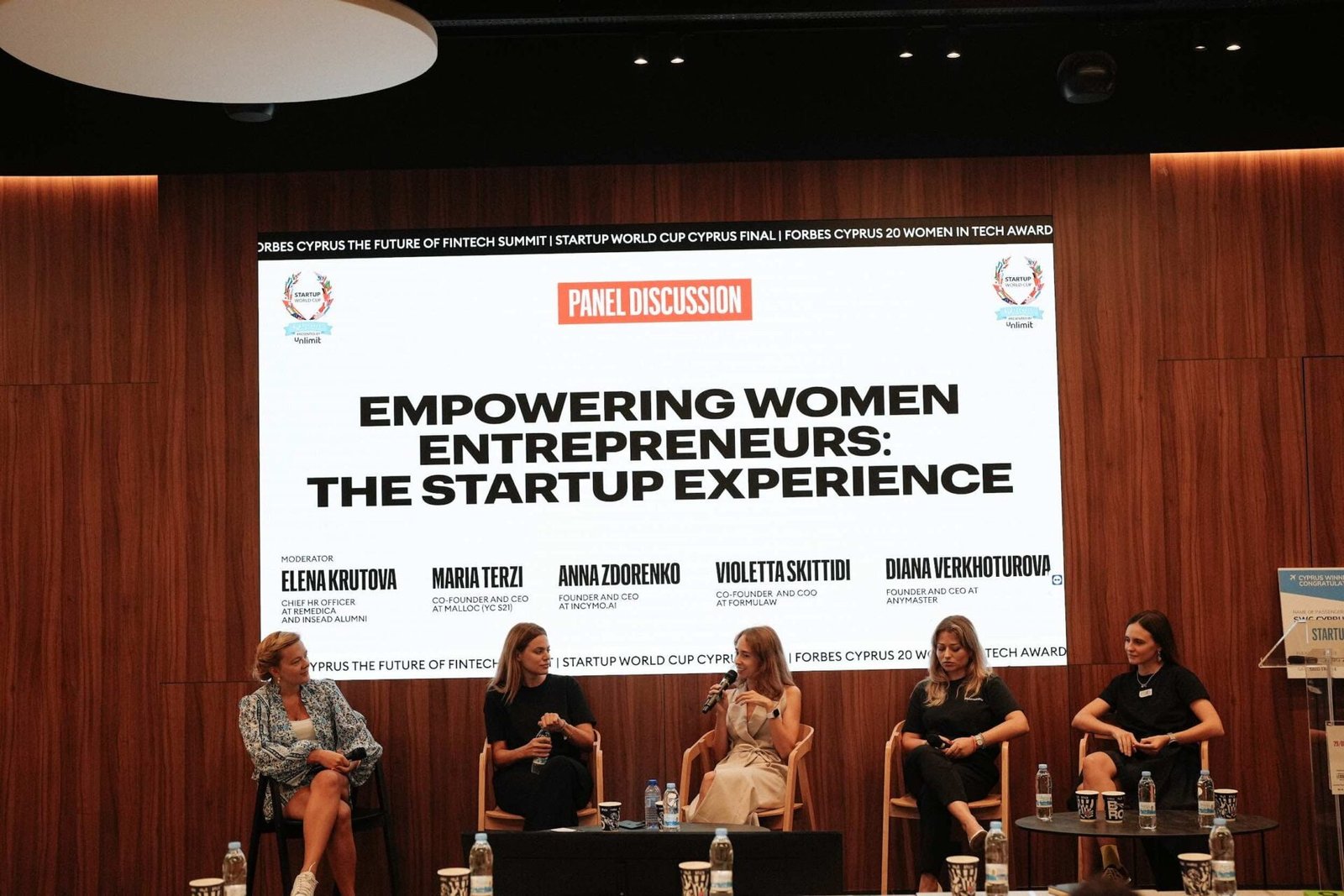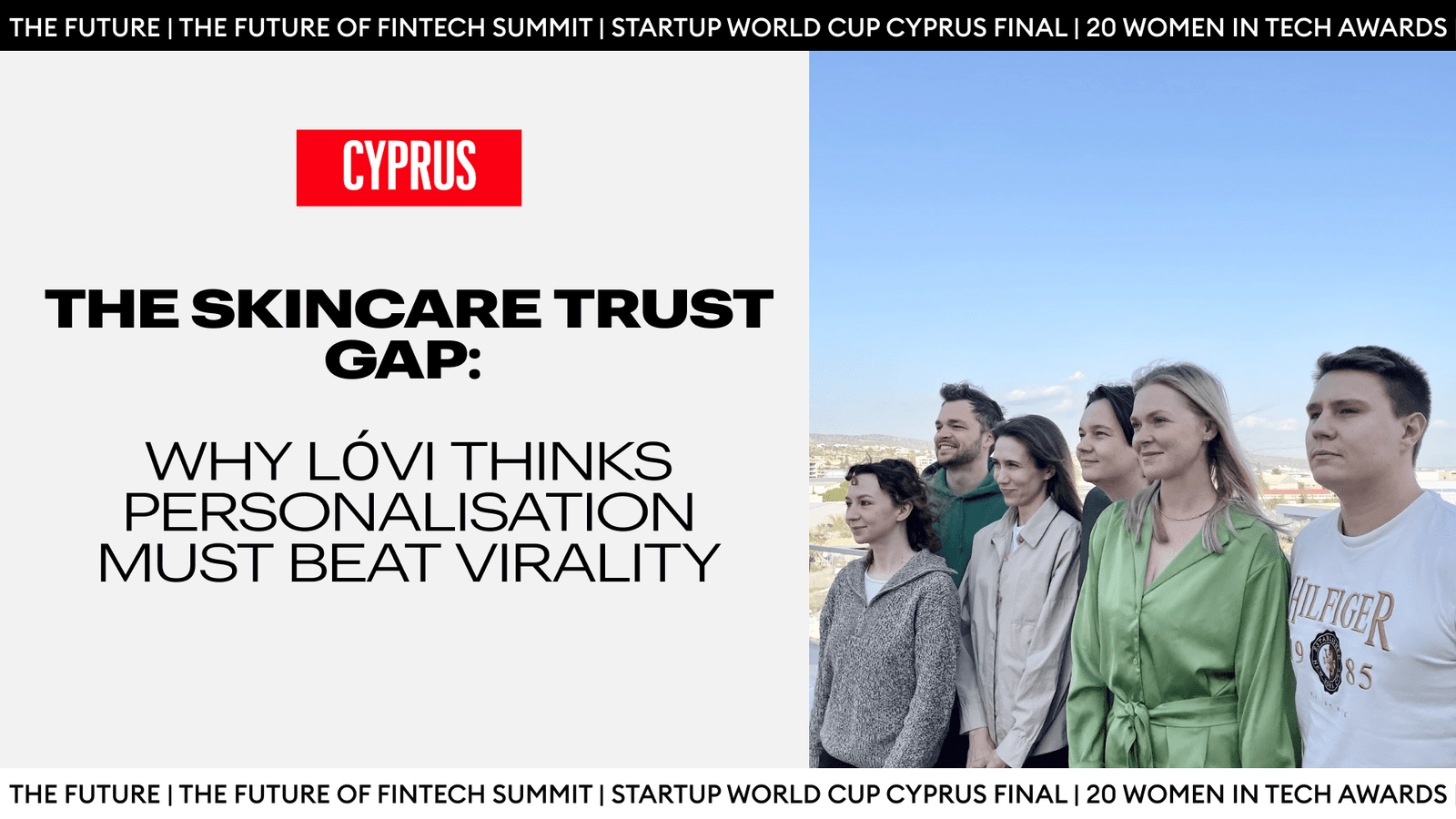Entrepreneurship has long been a challenging domain, with obstacles ranging from capital access to market competition. For women, these challenges can be amplified by structural inequalities and biases within the business ecosystem.
During the Cyprus Regional Finals of the Startup World Cup 2024, a distinguished panel of female entrepreneurs convened to discuss these very challenges and share their strategies for overcoming them.
Follow THE FUTURE on LinkedIn, Facebook, Instagram, X and Telegram
Titled Empowering Women Entrepreneurs: The Startup Experience, the event brought together Maria Terzi (Co-Founder and CEO of Malloc), Anna Zdorenko (Founder and CEO of INCYMO.AI), Violetta Skittidi (Co-Founder and COO of Formulaw), and Diana Verkhoturova (Founder and CEO of Anymaster). Moderated by Elena Krutova, Chief HR Officer at Remedica, the panel provided insightful perspectives on the entrepreneurial journey and offered practical advice for aspiring women business leaders.
Identifying the Opportunity
The path to entrepreneurship often begins with an idea, but more importantly, it involves recognising an opportunity. Maria Terzi shared her own journey, which started at the University of Cyprus, where she was a researcher. Faced with a limited ability to lead projects under a hierarchical system, Terzi sought something she could call her own. “I had a notebook full of ideas,” she remarked. “One stood out, and after pitching it, I was given the chance to submit a proposal.”
This opportunity evolved into Malloc, a cybersecurity startup that focuses on mobile security. Terzi’s experience highlights a fundamental truth for would-be entrepreneurs: the importance of taking initiative when opportunities arise. Her advice was clear: “If you have an idea, you may have a business.”
Anna Zdorenko echoed this sentiment, detailing how her entrepreneurial journey was shaped by the technological environment she found herself in. Having begun in 2015, her first startup emerged from the support of her technical university and collaborations with companies like Intel. “Technology is a great source for startups because it’s full of ideas,” Zdorenko stated, underscoring the importance of leveraging a supportive ecosystem for innovation.
Solving Problems Through Business
Entrepreneurship is not just about having an idea—it’s about solving problems. Violetta Skittidi found her inspiration while working as a paralegal, where she observed the inefficiencies in contract management. “Many small and medium-sized companies were struggling with managing their legal obligations,” she said. This realisation prompted her to co-found Formulaw, a legal technology startup that helps businesses manage their contracts more effectively and avoid costly mistakes. For Skittidi, the heart of her business lies in optimisation. “Efficiency is key,” she added.
Diana Verkhoturova drew inspiration from her personal experience, having grown up in a family of entrepreneurs. Watching her parents build a successful business, she absorbed the work ethic and resilience necessary for entrepreneurial success. Verkhoturova later founded Anymaster, a business dedicated to supporting households with tasks traditionally expected of women, thus freeing them to pursue entrepreneurial endeavours. Her message was poignant: “It’s about committing to something greater and inspiring the next generation of women to do the same.”
The Role of Family and Mentorship
When discussing the factors that inspired them to take the leap into entrepreneurship, the panellists unanimously agreed on the importance of familial support and mentorship. Diana Verkhoturova attributed much of her confidence to her grandfather, who consistently reinforced her capabilities from a young age. “He would tell me I was the smartest and strongest of the boys,” she recalled. This encouragement gave her the belief that she could succeed in a male-dominated industry.
Similarly, Maria Terzi shared a personal story of how her uncle’s advice helped her overcome her mother’s apprehension about an internship at Google. Terzi’s uncle, a respected figure in their family, told her mother: “Let her go. People pay to work at Google.” After that, Terzi’s family fully supported her career decisions. Her takeaway for parents? “Trust your children. They see the world as it is today and understand better than we do what opportunities lie ahead.”
While familial support was vital, mentorship also played a critical role in the panellists’ journeys. Violetta Skittidi noted how the guidance of experienced mentors helped her and her team navigate the complexities of the legal startup landscape. Zdorenko emphasised the importance of having a reliable team and mentors early on, stating, “With a strong support system, you can achieve far more than you would on your own.”

Conquering the Fear of Failure
The conversation inevitably turned towards the fear of failure—a common hurdle for aspiring entrepreneurs. Violetta Skittidi confessed that fear initially held her back from pursuing her business idea. “It’s difficult to face rejections from investors,” she admitted. However, she overcame this fear by pushing through with the support of those around her.
Diana Verkhoturova urged women to challenge the internal voices of self-doubt. “We are often afraid of making mistakes in business because we fear judgement,” she explained. But, as she pointed out, men typically do not carry this same burden of self-consciousness. Her advice was firm: “Kill the self-doubt. No one is better than you, and you have as much right to succeed as anyone.”
Maria Terzi offered a pragmatic perspective. “Startups fail,” she said plainly. “But if you have something inside you telling you this idea could work, then take the step. Commit the time and effort, and if you fail, you fail. At least you tried.”
Practical Steps for Aspiring Entrepreneurs
For those with ideas but hesitations about taking the first step, the panel provided practical and actionable advice. Anna Zdorenko recommended joining a startup ecosystem to connect with like-minded individuals and gain mentorship. “You don’t need to change your life overnight,” she advised. “Start small, validate your problem, find co-founders, and talk to potential clients. The more feedback you get, the more you can refine your business idea.”
Violetta Skittidi added that persistence is crucial, particularly in environments where rejection is common. “Find people who believe in your idea and use their expertise to guide you. It’s not always about having all the answers, but about having the right support.”
For Diana Verkhoturova, the message was simple: do not fear mistakes. “Mistakes are inevitable,” she said. “But if you allow fear to stop you, you’ll never see how far you can go.”
The panel discussion on Empowering Women Entrepreneurs offered invaluable insights into the unique challenges women face in the entrepreneurial world. From overcoming fear to harnessing the power of mentorship and family support, the stories shared were both instructive and inspiring. As Maria Terzi concluded, “If you believe in your idea, commit to it fully. The world needs more women in entrepreneurship—and your ideas might be the ones to change it.”
This panel exemplifies that while the road to entrepreneurship may be daunting, it is also filled with opportunities for growth, learning, and success. The message for aspiring women entrepreneurs was clear: the time to start is now.














